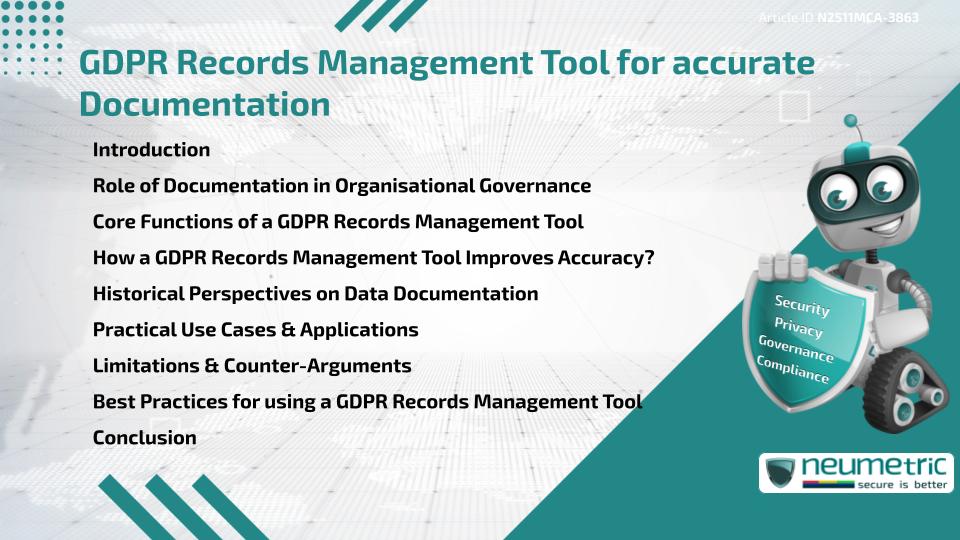Table of Contents
ToggleIntroduction
A GDPR Records Management Tool for accurate Documentation helps organisations maintain Reliable information, track Processing activities & comply with Governance expectations. A GDPR Records Management tool centralises Records, improves Consistency, supports Traceability & reduces Errors caused by scattered documents. It offers visibility into how Personal Information is handled, stored & shared. These strengths help teams create predictable documentation practices that enhance Trust, Accountability & Regulatory alignment.
Role of Documentation in Organisational Governance
Documentation serves as the backbone of responsible information management. It provides clarity, reduces uncertainty & ensures that decisions are supported by reliable records.
Without structured documentation, organisations may face inconsistent records or unclear responsibilities. A GDPR Records Management tool helps resolve these challenges by keeping information organised & accessible.
Core Functions of a GDPR Records Management Tool
A GDPR Records Management Tool provides several functions that support structured & responsible documentation:
- Centralised storage for Policies, Procedures & Processing records
- Templates for capturing essential Compliance information
- Version tracking to maintain clarity across updates
- Access Controls to protect Sensitive documents
- Monitoring Tools for verifying record completeness
- Audit support features for generating review-ready Documentation
How a GDPR Records Management Tool Improves Accuracy?
A GDPR Records Management tool improves accuracy by ensuring that documents follow consistent formats, remain up to date & reflect verified information. It functions like a well-organised filing system where every record has a clear label, a defined owner & a specific purpose. This structure reduces duplication, misplacement & inconsistency.
Key improvements include:
- Clear traceability of updates
- Reliable storage that prevents accidental loss
- Faster retrieval of information during reviews
- Stronger alignment with Governance expectations
- Better coordination across departments
Historical Perspectives on Data Documentation
In earlier decades, organisations stored records in paper folders, filing cabinets & distributed storage areas. These methods often led to misplaced documents & inconsistent record keeping. As digital systems became common, organisations gained faster access to information but also faced new challenges such as uncontrolled file sharing & inconsistent versions.
Modern Governance requirements encouraged structured digital documentation systems. A GDPR Records Management tool reflects this evolution by combining automation with oversight features.
Practical Use Cases & Applications
Organisations use a GDPR Records Management tool across a wide range of activities:
- Maintaining Records of Processing Activities
- Tracking Data Retention Schedules
- Documenting Access Rights & Responsibilities
- Supporting Internal Audits
- Recording Consent-related information
- Managing Privacy notices & Policy updates
- Coordinating Documentation across large teams
These use cases help organisations present clear & accurate documentation whenever required.
Limitations & Counter-Arguments
Although a GDPR Records Management tool provides strong benefits, some limitations exist.
Some believe that smaller organisations can manage documentation with basic folders, although this often becomes unreliable as teams grow. Others argue that tools cannot replace careful human verification because documentation still requires clear understanding & accurate input.
Another limitation involves configuration. If templates or access settings are incorrect, records may become inconsistent. These points reinforce the idea that technology supports responsible behaviour rather than replaces it.
Best Practices for using a GDPR Records Management Tool
Organisations can maximise value by applying several practical steps:
- Keep templates consistent across departments
- Review Access Permissions regularly
- Perform periodic checks on document completeness
- Train staff handling documentation
- Use clear naming conventions
- Review version histories to prevent conflicts
- Align tool outputs with Governance requirements
These practices help maintain structured, predictable & transparent documentation.
Conclusion
A GDPR Records Management tool provides a practical way to improve documentation accuracy, strengthen oversight & support responsible information practices. It centralises records, enhances traceability & reduces confusion caused by scattered files. By guiding teams through structured approaches, the tool helps maintain reliable & accountable documentation.
Takeaways
- A GDPR Records Management tool improves consistency & traceability
- It supports structured & reliable documentation practices
- It reduces errors caused by duplicated or misplaced files
- It strengthens Accountability across documentation workflows
FAQ
What does a GDPR Records Management tool store?
It stores Policies, Procedures, Processing records, Retention schedules & other Governance documents.
Does a GDPR Records Management tool help with audits?
Yes, it provides clear records that support internal & external reviews.
Does a GDPR Records Management tool require technical expertise?
Most tools are straightforward & require only basic training.
How often should records be updated?
They should be updated whenever Processes, Policies or Responsibilities change.
Is a GDPR Records Management tool suitable for small organisations?
Yes, consistent documentation benefits organisations of all sizes.
Need help for Security, Privacy, Governance & VAPT?
Neumetric provides organisations the necessary help to achieve their Cybersecurity, Compliance, Governance, Privacy, Certifications & Pentesting needs.
Organisations & Businesses, specifically those which provide SaaS & AI Solutions in the Fintech, BFSI & other regulated sectors, usually need a Cybersecurity Partner for meeting & maintaining the ongoing Security & Privacy needs & requirements of their Enterprise Clients & Privacy conscious Customers.
SOC 2, ISO 27001, ISO 42001, NIST, HIPAA, HECVAT, EU GDPR are some of the Frameworks that are served by Fusion – a SaaS, multimodular, multitenant, centralised, automated, Cybersecurity & Compliance Management system.
Neumetric also provides Expert Services for technical security which covers VAPT for Web Applications, APIs, iOS & Android Mobile Apps, Security Testing for AWS & other Cloud Environments & Cloud Infrastructure & other similar scopes.
Reach out to us by Email or filling out the Contact Form…


